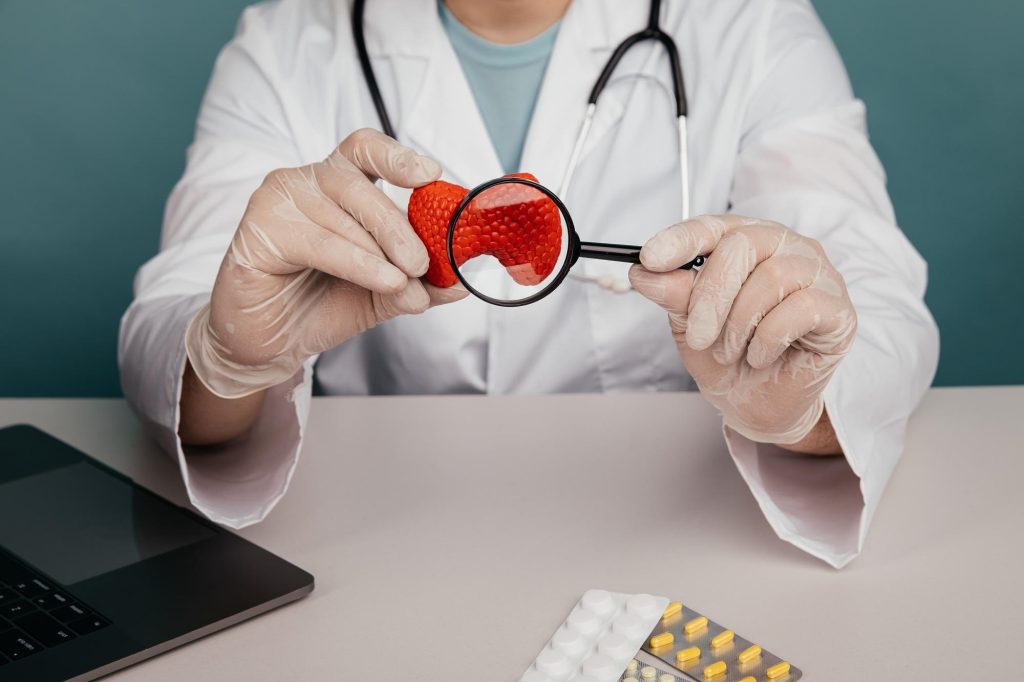Are you still confused and find yourself wondering whether you should or should not go for that favourite recipe of yours since your doctor said the word “hypothyroidism” the last time you visited?
Don’t worry! We’ve got your back on this. In this article, we will discuss what you should eat and what you should avoid in case you suffer from “hypothyroidism”.
Did I hear the word “thyroid”?
Well, the thyroid gland is a bilobed endocrine gland which is also known as the butterfly gland due to its shape. It secretes calcitonin and other thyroid hormones (T3 and T4) which play a major role in regulating our metabolism.
Overproduction of these hormones leads to the clinical condition of hyperthyroidism whereas their underproduction results in hypothyroidism.

What happens in hypothyroidism?
Hypothyroidism happens when the thyroid gland doesn’t make enough thyroid hormone. This condition also is called underactive thyroid. Hypothyroidism may not cause noticeable symptoms in its early stages. Over time, hypothyroidism that isn’t treated can lead to other health problems, such as high cholesterol and heart problems.
A few common symptoms marked in hypothyroidism are:
- Tiredness.
- More sensitivity to cold.
- Constipation.
- Dry skin.
- Weight gain.
- Puffy face.
- Hoarse voice.
- Coarse hair and skin.
- Muscle weakness.
- Muscle aches, tenderness and stiffness.
- Menstrual cycles that are heavier than usual or irregular.
- Thinning hair.
- Slowed heart rate, also called bradycardia.
- Depression.
- Memory problem.
What to eat?
- Micronutrients like iodine, selenium, and zinc in food help in the proper functioning of the thyroid.
- Certain food items should be avoided as they affect thyroid functioning adversely and make the situation worse.
- At times, the intake of food and supplements affects the absorption of thyroid replacement drugs. Therefore, these should be avoided.
Iodine-rich products:
- Dairy products like cheese, milk
- Iodized table salt
- Sea fish
- Whole eggs, etc.
Selenium-rich products:
- Amazon nuts
- Seafood: tuna, shrimp, etc.
- Chicken
- Eggs
- Oats
- Brown rice, etc.
Zinc-rich products:
- Seafood: oysters, crabs, etc.
- Genetically modified cereals
- Chicken
- Pulses
- Pumpkin seeds
- Yoghurt, etc.
What NOT to eat?
- The food products which hamper the production of thyroid hormones: are green vegetables belonging to the Cruciferae family, especially Russiankale, broccoli, cauliflower, cabbage, etc. Excess of Cruciferae interferes with the proper thyroid function and so, it should be avoided.
- Soy-containing food: soy milk, soy sauce, tofu, etc. Studies have shown that soy-containing foods interfere with the body’s ability to absorb thyroid medication hence, disrupting their action.
- Gluten-rich food. Gluten has been found to trigger inflammation, especially in cases of autoimmune disorders. Therefore, it is advised to avoid it.
- Processed food products: junk food, bakery products, carbonated drinks, etc. Processed foods are found to be rich in sodium. In a patient with hypothyroidism, high levels of sodium increase the risk of high blood pressure. Thus, it is better to avoid processed food altogether.
Quick things to remember
- Mostly it is advised that thyroid medication is taken on an empty stomach for better absorption. It should be taken half an hour to one hour before the first meal or a minimum of three to four hours after the last meal for the day.
- Medicines like these should be completely avoided within four hours of an iron or calcium-rich meal.
- Medications and supplementssuch as antacids, milk and other calcium-rich products, iron-rich products, fibrous foods, iodine-rich products, and soy sources are found to affect the absorption of thyroid drugs adversely.
For specific dosages and medication timings, always consult your doctor and medical experts.






















Share this article